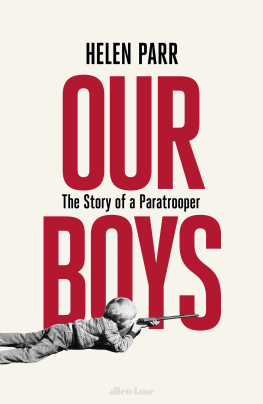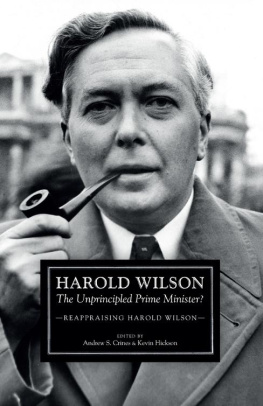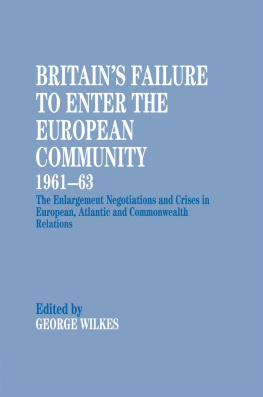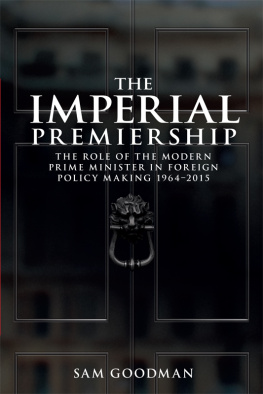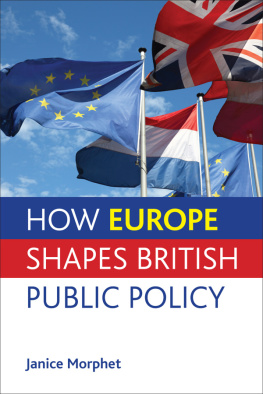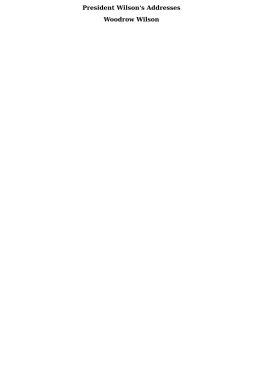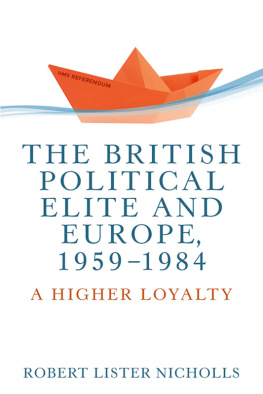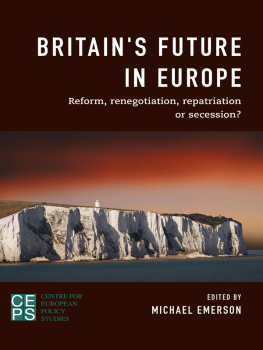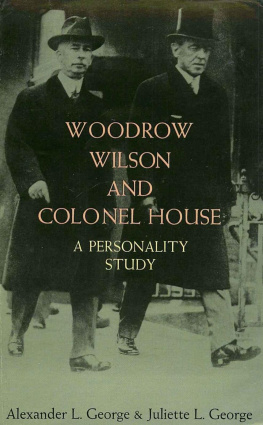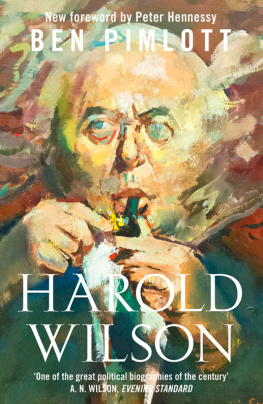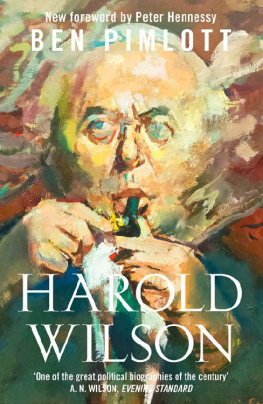
Britains Policy Towards the EuropeanCommunity
Harold Wilsons apparent volte-face on European Community membership in the autumn of 1966 has long puzzled commentators and Wilsons colleagues alike. Based on interviews, private papers and recently released evidence from the National Archives, this book provides a fresh interpretation of Wilsons policy towards the European Community.
Britains policy is analysed between 1964 when Harold Wilson took office, and 1967 when the French President General de Gaulle vetoed Britains membership application for a second time. Britains Policy Towards the European Community examines the rationale behind Britains approach, explaining why Wilson launched an initiative for membership when the French seemed certain to obstruct. Helen Parr considers Wilsons handling of the Cabinet, and elucidates Britains diplomacy towards the Six, placing British policy towards Europe within the context of Britains foreign policy transition from a global to a regional role. This book will prove to be essential reading for students of postwar British history and those interested in Britains historical relationship with Europe.
Helen Parr is a Lecturer in the School of Politics, Philosophy and International Relations at Keele University. She is also an editor of The Labour Governments 19641970 Reconsidered (Routledge forthcoming).
British foreign and colonial policy
Series Editor: Peter Catterall
ISSN: 14675013
This series provides insights into both the background influences on and the course of policy making towards Britains extensive overseas interests during the past 200 years.
Whitehall and the Suez Crisis
Edited by Saul Kelly and Anthony Gorst
Liberals, International Relations and Appeasement
The Liberal Party, 19191939
Richard S.Gray son
British Government Policy and Decolonisation, 19451963
Scrutinising the official mind
Frank Heinlein
Harold Wilson and European Integration
Britains second application to join the EEC
Edited by Oliver Daddow
Britain, Israel and the United States, 19551958
Beyond Suez
Orna Almog
The British Political Elite and the Soviet Union, 19371939
Louise Grace Shaw
Britain, Nasser and the Balance of Power in the Middle East, 19521967
From the Egyptian Revolution to the Six Day War
Robert McNamara
British Foreign Secretaries since 1974
Edited by Kevin Theakston
The Labour Party, Nationalism and Internationalism, 19391951
R.M.Douglas
Indias Partition
The story of imperialism in retreat
D.N.Panigrahi
Empire as the Triumph of Theory
Imperialism, information and the colonial society of 1868
Edward Beasley
The British Intervention in Jordan, 1958
Stephen Blackwell
The Office of the Permanent Under-Secretary of the Foreign Office,
18541945
Thomas Otte
Mid-Victorian Imperialists
British gentlemen and the empire of the mind
Edward Beasley
Britains Policy Towards the European Community
Harold Wilson and Britains world role, 19641967
Helen Parr
British Policy in Aden and the Protectorates 195567
Last outpost of a Middle East empire
Spencer Mawby
Britains Policy Towards the European Community
Harold Wilson and Britains world role, 19641967
Helen Parr
First published 2006 by Routledge 2 Park Square, Milton Park, Abingdon, Oxon OX14 4RN
Simultaneously published in the USA and Canada by Routledge 270 Madison Ave, New York, NY 10016
Routledge is an imprint of the Taylor & Francis Group
This edition published in the Taylor & Francis e-Library, 2005.
To purchase your own copy of this or any of Taylor & Francis or Routledges collection of thousands of eBooks please go to http://www.ebookstore.tandf.co.uk/.
2006 Helen Parr
All rights reserved. No part of this book may be reprinted or reproduced or utilised in any form or by any electronic, mechanical, or other means, now known or hereafter invented, including photocopying and recording, or in any information storage or retrieval system, without permission in writing from the publishers.
The publisher makes no representation, express or implied, with regard to the accuracy of the information contained in this book and cannot accept any legal responsibility or liability for any errors or omissions that may be made.
British Library Cataloguing in Publication Data A catalogue record for this book is available from the British Library
Library of Congress Cataloging in Publication Data A catalog record for this book has been requested
ISBN 0-203-31029-2 Master e-book ISBN
ISBN 0-714-65614-3 (Print Edition)
To my parents
Foreword
By Sir Michael Palliser
Helen Parr has chosen to write about a particularly intricate and interesting segment of the complicated jigsaw of Britains post-World War Two relationship with the other countries of Western Europe. As with any jigsaw, the segment has to fit in comfortably with those that precede and those that follow it, if the picture as a whole is in due course to be revealed. That final revelation, of course, is still a long way off. There remain many other pieces of the puzzle to be fitted in first, over the coming years. The period from 1964 to 1967 is only a short but highly significant moment in the long story. The author, thanks to meticulous research and real scholarship, achieves the linkage with the past and the future and also gives a detailed, and I believe, accurate account of the formidable political and economic problems with which, in its search for EEC membership, the government of Prime Minister Harold Wilson had to contend, both on the domestic front and abroad.
I was fortunate enough to be for two of the years in question19667the Foreign Office Private Secretary to Wilson in 10 Downing Street, having succeeded my friend and colleague Oliver Wright after Wilsons victory in the March 1966 general election. That was traditionally at the time the number two post in the team of private secretaries at Number Ten. I had to ensure that the Prime Minister was fully informed about every aspect of foreign relations, to convey his reflections or comments to the Foreign Secretary and to ensure in turn that the latters views and advice were drawn fully to the Prime Ministers attention. This remit was not, of course, confined to any particular aspect of foreign policy or any particular region of the world. I had, so far as possible, to cover the globe. But by the time I joined Number Ten, Europe had become a particularly important item on the Prime Ministers agenda.
This was satisfying to me. As a young army officer in a tank battalion in the North West European campaign in 19445, and subsequently for 18 months in the postwar Army of Occupation in Germany, I had seen with dismay the appalling destruction and human misery resulting from the second war within 20 years started by the nations of Europe. As many others, I had resolved that this must somehow be prevented from ever happening again, so I welcomed the efforts of the six nations of Western Europe to form a real community and I regretted the reluctance of successive British governments, until that of Harold Macmillan, to become involved in the process. Naturally, as a junior in the Foreign Office in the early years of my service there, my personal views were of no account, no doubt rightly so. But by 1964, when I was Head of the Foreign Office Planning Staff, the attitude of the then Conservative government coincided with my own, even after the blow of General de Gaulles 1963 veto. The arrival of the Labour government after the 1964 general election appeared to change the European picture, as the book brings out. So, when I was interviewed by Harold Wilson to see if he would accept me as his private secretary in 1966, after a friendly and positive conversation I thought it only right to tell him that I was very concerned to see active British participation in Europe and that I would not wish him to take me on under a misapprehension. He laughed. We wont have any difficulty over Europe: youll see he replied. And nor did we.


